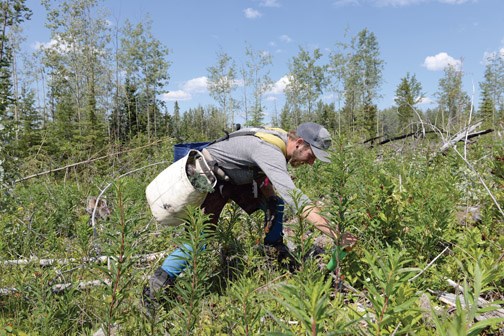The annual flood of tree planters into the city has been reduced to a trickle and those who are stopping in Prince George appear to have been laying low as part of the effort to contain the COVID-19 pandemic.
Late morning Wednesday, seven people in their 20s were in the parking lot of a local motel packing their cars for the final leg of their drives to their camps in northern B.C. following an overnight layover.
To get here, four of them drove 14 hours straight from the Kootenays while another three took a more leisurely six-day trip in their compact car from the Ottawa area in Ontario.
All the while, they have been sure to keep their distance from the locals and other crews they may come across. They also had to submit travel plans and have kept logs recording their temperatures and other indicators of their health for the past two weeks.
Once at camp, they will be prohibited from spending their days off in nearby communities.
It won't be easy, they admitted. For one of the young women from Ontario, now in her fourth season of planting trees in B.C., it will mean the end of some traditions.
(They declined to provide their names because they did not have permission from their employers to speak to the press.)
"A favourite café to go to on our day off, I won't be able to do that anymore," she said. "I'm kind of sad but we want to respect how the towns are feeling. Obviously, they don't want things to go sideways, which is completely fair."
Even once at their camps, they will need to keep their distance. They have been divided into work pods and are to drive to a work site in the same truck and eat at the same table. That way, if someone gets sick, the entire pod gets quarantined.
On April 25, a day after the Provincial Health Office issued guidelines for the industry, Prince George-based Folklore Contracting Ltd. posted a seven-page outline of the do's and don'ts its employees must follow.
Dealing with laundry takes up a notable portion of the posting. Twice each week, "town runners" will take in half of a camp's laundry - 30 to 35 loads each time - and planters can expect to have their cleaned clothes back by the next day or two.
"You will need to have more planting clothing that you are typically accustomed to bringing, in order to accommodate this system," the company says. "We recommend bringing enough planting clothing for at least seven days."
They are also urged to bring extra books and downloads of movies and TV shows, "or anything else that can help keep you healthy and happy."
Other companies have put similar plans in place, sometimes with a blunter message.
"Do not arrive early to the region that you will be planting in. These communities do not want to see you at all. Your presence will jeopardize our season," says an April 6 posting on the website for Brinkman and Associates Reforestation.
With the exception of domestic flights, it also says it will not accept workers who have traveled to their job sites on public transportation.
Getting everything in place has meant delaying the start of the planting season by about two weeks. It amounted to a drop-dead deadline, according to one of the planters.
"Because the season's been pushed back, they had to freeze all of the trees and if we don't start now they will die - hundreds of thousands of trees," she said.
Through the industry's lobbying group, the Western Silviculture Contractors Association, companies have been hoping to get financial help from the provincial government to cover the additional costs related to meeting the requirements but so far without luck.
In late April, the Ministry of Forests did defer for three months the stumpage lumber producers must pay to the Province. To qualify, they must continue to meet their reforesting obligations and so, could end up passing one some of those savings to the contractors.



